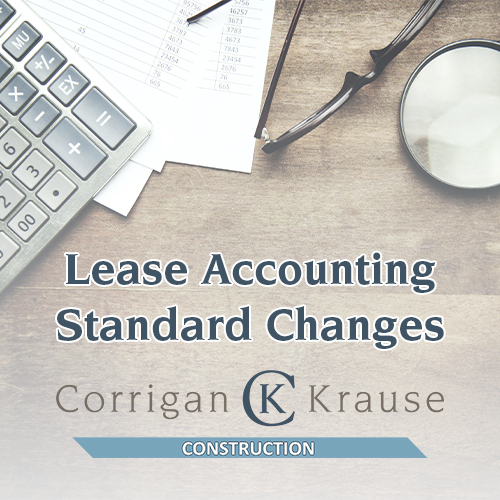
Lease accounting standards are changing, aiming to improve transparency and make it easier to compare statements. Here’s what construction companies need to know.
The effective date for the new lease standards has changed a few times. As it stands now, private companies and most not-for-profit organizations must start using the new lease accounting standards in annual reporting periods beginning after 12/15/2021. For example, if your year end is 12/31, you must adopt the new standards for your year beginning 1/1/2022 and ending 12/31/2022. For an entity with a 3/31 year end, the new lease standards are required for the fiscal year beginning 4/1/2022 and ending 3/31/2023. Leases that have terms of 12 months or less generally do not need to be included on the balance sheet, however. Additionally, capital leases are now referred to as finance leases.
Changes to Consider
This change in compliance isn’t quite as simple as transferring where you’re reporting your leased assets.
Previously, there were two ways to classify a lease:
- As a “capital” lease, where ownership of the asset transferred to the lessee. Capital leases were recorded on the balance sheet.
- As an “operating” lease, where only the right to use the asset transferred. Operating leases were not included on the balance sheet, but were disclosed in the footnotes of the financial statements.
With the new lease accounting standards, you’ll want to take each lease individually and assess how you will account for the leased asset:
- Month-to-month leases: Review any current leases you have listed as month-to-month. If the asset is solely used by the lessee and the lessee is guaranteeing the debt by providing the cash flow necessary to service the debt, then a longer lease may be appropriate.
- Related-party leases: Although these leases may be a month-to-month or under 12 month arrangement, depending on the situation, if the arrangement functions more like a longer-term lease, it must be recorded on the balance sheet.
- Job costing: The new lease standards directly affect how you report leases that are alleviating a debt. Accurately capturing your job costs will likely change, depending on what the cash flow of paid leases provide to your business.
While the new reporting standards do not change the core economics of your business, certain important finance ratios may shift. If your company currently has a number of off-balance sheet leases that, going forward, will be recorded on the balance sheet, it is a good idea to meet with your lenders and sureties about the potential changes in your reporting. A sudden increase in liabilities on a balance without prior warning or explanation may trigger cause concern with lenders, so it’s best to make sure everyone is on the same page. Depending on your situation, you may want to discuss updating the terms of any covenant to build in needed flexibility to prevent violations brought on by any potential future changes to accounting standards.
What Contractors Need to Know
There are a few items contractors should pay close attention to:
- Leases include everything – equipment, trucks, storage, yard and office spaces and facilities. Gather ALL lease documents. Record all the lease terms on the balance sheet. If you haven’t included a particular lease on the balance sheet before, you must record the value as a right-to-use asset at the present value of the lease payments.
- Working capital will initially decrease under the new leasing standard. As the next years’ worth of lease payments are added to current liabilities, your working capital and, thus, your bonding capacity, will decrease initially.
- Debt covenants may be affected. Check the terms on your bank loans. You may be required to maintain a certain debt to equity ratio and this ratio may be negatively affected by the increase in liabilities under the new standard.
We’re Here to Help
Navigating the updated lease accounting standards for doesn’t have to be confusing or stressful. The team at Corrigan Krause can help. Email info@corrigankrause.com for more information.
